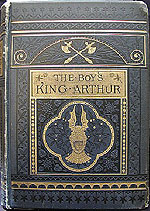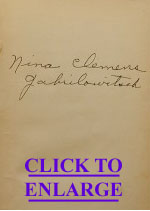|
There Sir Launcelot unarmed him, and set his harness by
him, and went to bed, and anon he fell on sleep. So soon
after there came one on horseback, and knocked at the gate
in great haste. And when Sir Launcelot heard this he arose
up, and looked out at the window, and saw by the moonlight
three knights came riding after one man, and all three
lashed on him at once with swords, and that one knight
turned on them knightly again, and defended him.
"Truly," said Sir Launcelot, "yonder one knight shall I
help, for it were shame for me to see three knights on one,
and if he be slain I am partner of his death."
And therewith he took his harness and went out at a
window by a sheet, down to the four knights, and then Sir
Launcelot said on high [in a loud voice], "Turn you
knights unto me and leave your fighting with that
knight."
And then they all three left Sir Kay, and turned unto
Sir Launcelot, and there began great batttle, for they
alighted all three, and struck many great strokes at Sir
Launcelot, and assailed him on every side. Then Sir Kay
dressed him for to have holpen Sir Launcelot.
"Nay, sir," said he, "I will none of your help,
therefore as ye will have my help let me alone with
them."
Sir Kay for the pleasure of the knight suffered him to
do his will, and so stood aside. And then anon with six
strokes Sir Launcelot had stricken them to the earth.
And then they all three cried, "Sir knight, we yield us
unto you as man of might matchless."
"As to that," said Sir Launcelot, "I will not take your
yielding unto me, but so that ye yield you unto Sir Kay the
seneschal; on that covenant I will save your lives and else
not."
"Fair knight," said they, "that were we loath to do; for
as for Sir Kay we chased him hither, and had overcome him
had not ye been; therefore to yield us unto him it were no
reason."
"Well, as to that," said Sir Launcelot, "advise you
well, for ye may choose whether ye will die or live, for
and [if] ye be yielden it shall be unto Sir
Kay."
"Fair knight," then they said, "in saving our lives we
will do as thou commandest us."
"Then shall ye," said Sir Launcelot, "on Whitsunday next
coming go unto the court of King Arthur, and there shall ye
yield you unto Queen Guenever, and put you all three in her
grace and mercy, and say that Sir Kay sent you thither to
be her prisoners."
"Sir," they said, "it shall be done by the faith of our
bodies, and we be living."
And there they swore, every knight upon his sword. And
so Sir Launcelot suffered them to depart. And then Sir
Launcelot knocked at the gate with the pommel of his sword,
and with that came his host, and in they enetered, Sir Kay
and he.
"Sir," said his host, "I wend ye had been in your
bed.:"
"So I was," said Sir launcelot, "but I arose and leaped
out at my window for to help an old fellow of mine."
And so when they came nigh the light Sir Kay knew well
that it was Sir Launcelot, and therewith he kneeled down
and thanked him of all his kindness that he hath holpen him
twice from the death.
"Sir," said he, "I have done nothing but that I ought to
do, and ye are welcome, and here shall ye repose you and
take your rest."
So when Sir Kay was unarmed he asked after meat, so
there was meat fetched him, and he ate strongly. And when
he had supped they went to their beds, and were lodged
together in one bed. On the morn Sir Launcelot arose early,
and left Sir Kay sleeping: and Sir Launcelot took Sir Kay's
armor and his shield and armed him: and so he went to the
stable and took his horse, and took his leave of his host,
and so he departed. Then soon after arose Sir Kay and
missed Sir Launcelot: and then he espied that he had his
armor and his horse.
"Now, by my faith, I know well that he will grieve some
of King Arthur's court: for on him knights will be bold,
and deem that it is I, and that will beguile them; and
because of his armor and shield, I am sure that I shall
ride in peace." And then soon after departed Sir Kay, and
thanked his host.
|


